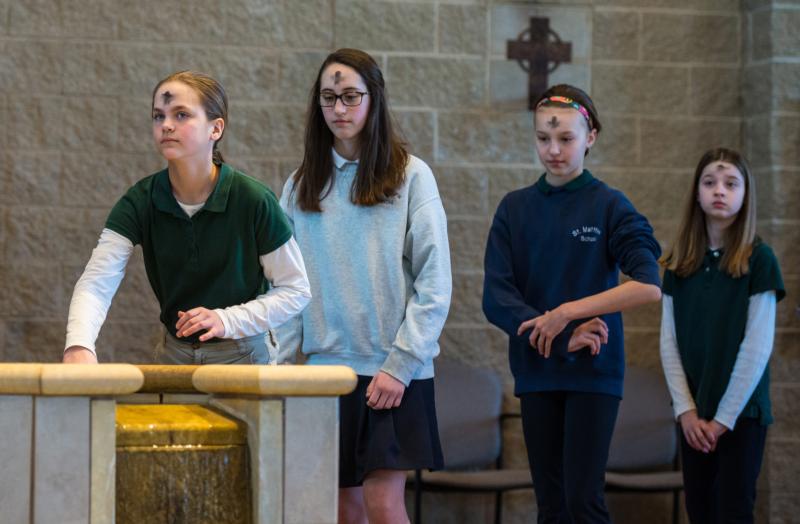
St. Matthew School students take turns blessing themselves with holy water on Ash Wednesday 2015 at St. Matthew Church in Allouez, Wis. From the moment we walk into church and bless ourselves with holy water, we are connected with the apostles who were sent on a mission and sealed the newly baptized by marking their foreheads with the sign on the cross. (CNS photo/Sam Lucero, The Compass)
The celebration of the Eucharist is “the source and summit of the Christian life,” according to the Catechism of the Catholic Church (No. 1324). Yet for many — from faithful Catholics to first-time participants –the Mass can appear mysterious, if not altogether confusing.
It’s as if each Mass offers two or three puzzle pieces that you need to connect in order to see a beautiful picture in full.
When we focus on the Scriptural basis of the Mass, we can more easily see that picture.
Of course, sacred Scripture has a prominent place at Mass in the readings from the Old and New Testaments, the singing of the Psalms and the words of Jesus at the consecration of the bread and wine.
[hotblock]
However, even the silent gestures of the Mass are steeped in the word of the Lord. From the moment we walk into church and bless ourselves with holy water, we are connected with the apostles who were sent on a mission and sealed the newly baptized by marking their foreheads with the sign on the cross (Ez 9:4, Eph 1:3, Rv 7:3).
Jesus commanded his disciples to baptize in the name of the Father, the Son and the Holy Spirit in Mt 28:16-20. For those who are baptized, this action of dipping our fingers in the holy water and blessing ourselves reminds us that we are redeemed and that we belong the Christ.
As the Mass proceeds, we can detect a pattern through the dialogue between the faithful and God that is mediated through the priest. Our prayer ascends to God and then his word descends to us. Our gifts of bread and wine are presented and “offered up” to the Father, and the Father presents us with his best gift, Jesus, fully present, body, blood, soul and divinity in the Eucharist.
In this dialogue we hear words that are taken directly from Scripture: “The Lord be with your spirit” (2 Tm 4:22); “Lord, have mercy” (Ps 30:11); “Holy, holy, holy” (Is 6:3); the Our Father prayer (Mt 6:9-13); “Lord … I am not worthy to have you enter under my roof” (Lk 7:6); “Behold, the Lamb of God” (Jn 1:29); and “This is my body” (Lk 22:19).
Throughout the Mass, our actions are not arbitrary but come directly from Scripture. Kneeling (Acts 21:5, Ps 95:6), singing (Acts 16:25), offering a sign of peace (1 Thes 5:26), offering bread and wine (Gn 14:18, Mt 26:26-28), gathering around an altar (Gn 12:7, Rv 16:7), the use of incense (Rv 8:4) are gestures that come to us from the Bible.
The puzzle pieces — the readings, actions and words at Mass — do indeed reveal a bigger picture, one of a God who loves us and died for us so that we may come alive in this life and have eternal life. The words and actions of the faithful and the priest are rooted in our “family history” which comes to us in sacred Scripture.
***
Wright is the author of several books, including “25 Life-Changing Questions from the Gospels.”



Share this story